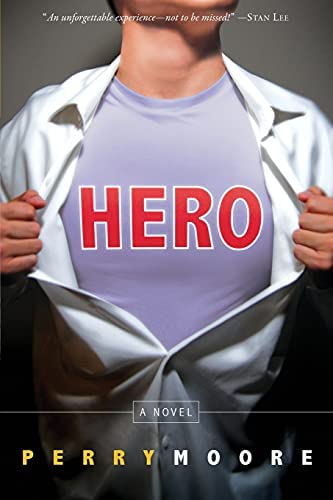 Perry Moore’s debut novel Hero is at its base a coming-of-age story. In first-person narrative, we’re told the details of Thom Creed’s teenage existence. Thom has trouble relating to his father. Thom has trouble relating to his peers, to school, to the basketball team. Thom has trouble coming to terms with his sexuality. Thom has trouble coming to terms with his superpower.
Perry Moore’s debut novel Hero is at its base a coming-of-age story. In first-person narrative, we’re told the details of Thom Creed’s teenage existence. Thom has trouble relating to his father. Thom has trouble relating to his peers, to school, to the basketball team. Thom has trouble coming to terms with his sexuality. Thom has trouble coming to terms with his superpower.
If not for the superpower, Thom could be any number of teens living quiet, middle-class lives anywhere in America. There’s little to distinguish Thom Creed’s world from ours other than the small number of individuals with seemingly random abilities beyond the ordinary. Some people fly. Some spread disease. Others have superstrength, or superspeed, or see into the future. The most celebrated of these form the League: an organization of celebrity superheroes who perform the day-to-day business of saving ordinary citizens from natural disasters and supervillains alike.
Thom, like many kids, idolizes the League. But unlike anyone else he knows, he must keep his fascination and admiration a secret from his father. His father, an ex-superhero, was disgraced and abandoned by the League for a catastrophic event which occurred years earlier; an event which left him disfigured and bitter, and robbed Thom of his mother. When Thom is invited to League tryouts by his supercrush and superidol, League Hero Uberman, he can’t help defying what he knows would be his father’s wishes and sneaking off to give it his best. The last thing Thom wants to do is add to his father’s humiliation. It’s hard enough with both of them ignoring the increasingly obvious fact Thom’s gay. It’s doubly hard being a closeted superhero, too.
I enjoyed Hero, though it didn’t win me over primarily with its writing, or even its characters. The writing was a little ragged for me. I wasn’t always able to follow the sequence of events without effort (for example, the timing of the disappearance of Thom’s mother – central to the plot – was muddled in the beginning, though clearer by the end). The characters, even ones we’re meant to admire, didn’t always achieve enough depth for me to care about their fates (with a few wonderful exceptions – there are a lot of characters of keep track of here; it would have been difficult in the space of a single novel to make them all come to life). There seemed to be some inconsistent fluctuations in voice, which I suppose isn’t necessarily inappropriate, since it mirrors the fluctuation of the thoughts and abilities, even the maturity level, of the main character. There’s meant to be growth here, and there is.
What did win me over was the absolutely brilliant use of Thom’s struggle to understand himself and his place in the world as a superhero paralleled with his struggle to understand himself as gay. All this, of course, set against the familiar coming-of-age backdrop of the struggle to understand himself as adult. Weaving the three elements together, Moore manages to highlight the poignancies of each, and to forge a single, universal tale of teenage angst, self-loathing, redemption, and resolution.
(Hyperion, 2007)
